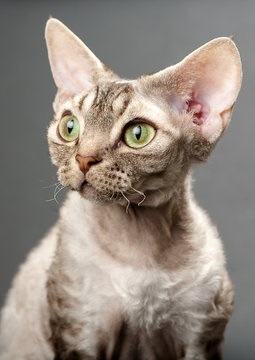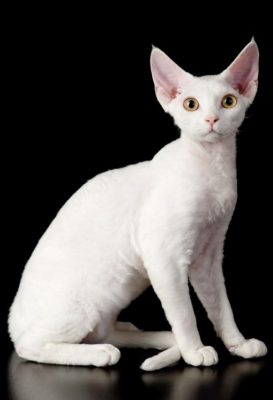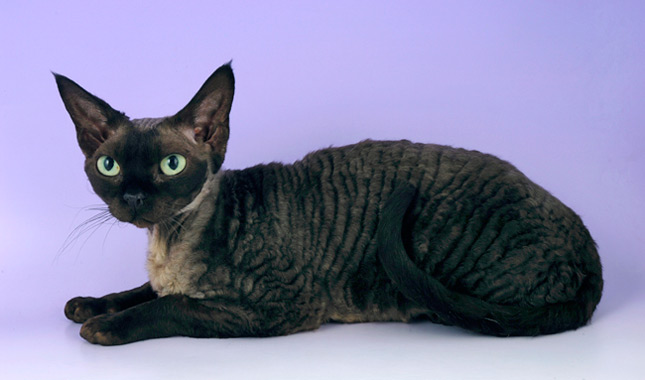Devon Rex
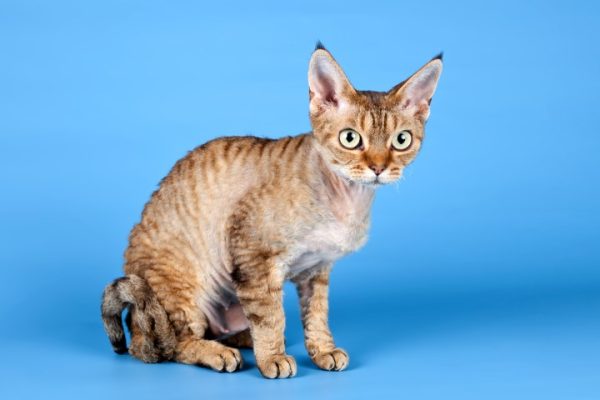
At first sight, Devon Rexes seem arrogant and not very contactable cats. However, this is a huge misconception. In their fantastic affection for humans, they resemble dogs. Devon Rexes are devoted to their owner and will fight for every minute of his attention. It’s also a tenacious breed, so you won’t be able to be alone. Devon Rex will be looking to hop on your lap and shoulders, desk, couch, and anywhere else to bask in your lap.
Table of Contents
Breed Information
| Origin | United Kingdom |
| Size | Males 27-30 cm Females 25-27 cm |
| Weight | Males 3.5-4.5 kg Females 2.5-3.5 kg |
| Fur Type | Short-haired |
| Color | Any color variations are possible |
| Lifestyle | Indoors |
| Lifespan | 10-15 years |
| FIFe Classification | Category III: “Short-haired and Somali” Breed designation – DRX |
| WCF Classification | Group 3: “Short-haired” Breed designation – DRX |
| TICA Classification | DR |
| Group | Short-haired cats, hypoallergenic cats |
| Price | $150-400 |
Breed Photos
Origin History
The first Devon Rex was found among wild kittens in 1960. Near abandoned springs, on Devonshire’s outskirts, a funny big-eared kitten attracted Briton Beryl Cox’s attention. Beryl took the kitten home and named it Curly. Curly’s unusual appearance attracted felinologists in Great Britain. Felineologist Brian Sterling Webb at the time studied the genotype of the breed and got Curly for breeding. Curly’s kitten is considered the founder of the Devon Rex breed.
Initially, researchers of the breed talked about Devon Rex being related to Cornish Rex. This version was put forward because of similar wavy “coats” of the breed. However, this was disproved after the experimental mating of the breeds. Until 1970, Devons and Cornish Rexes had the same branch formation. It wasn’t until 1979 that the PCA gave Devon Rex the long-awaited standard and official recognition.
Appearance
The appearance of the representatives of the breed is quite impressive. Devon Rexes are called alien cats or elves because of their soft wavy coat, big eyes, and ears. The coat’s curls are due to a mutation in one of the genes responsible for fur structure. According to the standard, the Devon Rex has a small head, which must be stretched wide. The cheeks are rounded. The chin is quite massive. In general, the head has a wedge-like shape and relief contour.
Huge, deep-set ears also characterize the breed. The eyes are large, oval. Moderately widely spaced. The look of the Devon Rex is somewhat mysterious. The color of the eyes depends on the color. Most often, there are representatives with clear blue eyes. Green, yellow or golden-green eyes are also possible. The neck is not long, thin, and graceful.
The physique is muscular, flexible, and slender. The limbs are long, and the paws of the Devon Rex are compact. The tail is thin, long, with a well-rounded tip. The hair on the tail is short but not sparse. Devon Rex fur is short and incredibly soft to the touch. “Coats” of these ears are characterized by a very short “nap” with a slight wave. The small amount of hair makes the breed hypoallergenic. There are many variations of coat color Devon Rex. The most common are: white, blue, black, cream, ginger, brown, platinum, chestnut, lavender, and light cream.
Character
At first sight, Devon Rexes seem arrogant and not very contactable cats. However, this is a huge misconception. In their fantastic affection for humans, they resemble dogs. Devon Rexes are devoted to their owner and will fight for every minute of his attention. It’s also a tenacious breed, so you won’t be able to be alone. Devon Rex will be looking to hop on your lap and shoulders, desk, couch, and anywhere else to bask in your lap.
They are playful and friendly, well suited as a pet for a child. They are calm towards other animals and dogs; they are sure to find a common language. They do not tolerate loneliness and will not suit a man who is away at work day and night.
Care
The presence of a short coat reduces the care of the Devon Rex to a minimum. A plus of the breed is also considered an almost complete absence of molting. Remember, the Devon Rex fur is very fragile and weak. Comb it with hard brushes is strictly prohibited. Not only will it traumatize and scare the pet, but it can leave it almost bald.
All you need to do is gently remove excess hair with your hand or a damp towel. The large ears of the Devon Rex require careful care. Unfortunately, they are prone to infections. To avoid this, clean your pet’s ears weekly. Brushing teeth and claw trimming are recommended once every few weeks.
Education
Owners of Devon Rexes note their propensity for learning, as well as their high level of intelligence. They instantly absorb new information and try to please the owner. The breed is considered inquisitive but completely non-problematic. Do not be too strict; let the pet frolic. By the way, Devon Rexes like to jump on tables and tall cabinets, but at the same time, they are not treacherous.
Common Diseases
The Devon Rex is considered a fairly healthy breed with a strong immune system. This young cat breed has not yet managed to acquire a list of serious diseases. However, the risk of some diseases still exists:
- hypertrophic cardiomyopathy;
- obesity;
- condition called hereditary myopathy, which affects muscle function.
Nutrition
Devon Rex is a breed prone to gaining weight. As such, you should carefully monitor the amount of food your pet eats and its caloric content. Devon Rex menus should consist of low-fat foods or premium dry food.
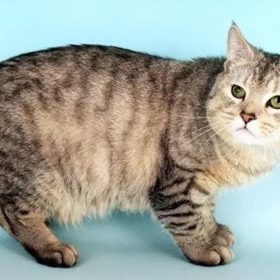 Manx
Manx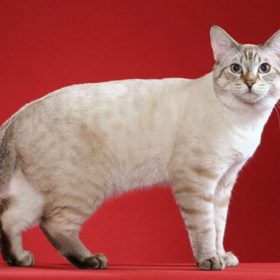 American Bobtail Shorthair
American Bobtail Shorthair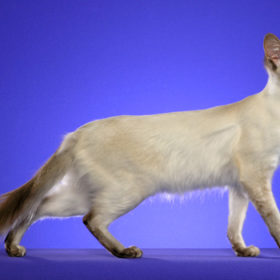 Balinese Cat
Balinese Cat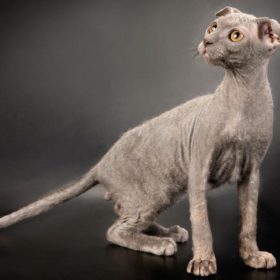 Ukrainian Levkoy
Ukrainian Levkoy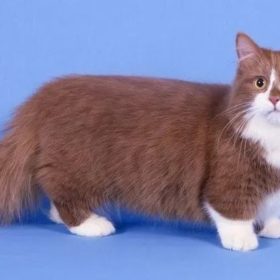 Munchkin Longhair
Munchkin Longhair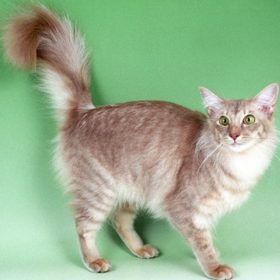 Javanese
Javanese